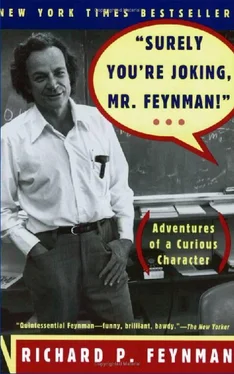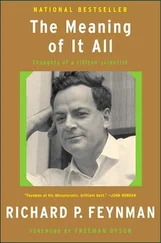It was a lady I knew who was angry at me because I had come back from vacation and didn’t immediately call her up to tell her I was back. I let her in, and tried to explain that I was just now very busy, that I had just discovered something, and it was very important. I said, “Please go out and let me finish it.”
She said, “No, I don’t want to bother you. I’ll just sit here in the living room.”
I said, “Well, all right, but it’s very difficult.”
She didn’t exactly sit in the living room. The best way to say it is she sort of squatted in a corner, holding her hands together, not wanting to “bother” me. Of course her purpose was to bother the hell out of me! And she succeeded—I couldn’t ignore her. I got very angry and upset, and I couldn’t stand it. I had to do this calculating; I was making a big discovery and was terribly excited, and somehow, it was more important to me than this lady—at least at that moment. I don’t remember how I finally got her out of there, but it was very difficult.
After working some more, it got to be very late at night, and I was hungry. I walked up the maims street to a little restaurant five or ten blocks away, as I had often done before, late at night.
On early occasions I was often stopped by the police, because I would be walking along, thinking, and then I’d stop—sometimes an idea comes that’s difficult enough that you can’t keep walking; you have to make sure of something. So I’d stop, and sometimes I’d hold my hands out in the air, saying to myself, “The distance between these is that way, and then this would turn over this way …”
I’d be moving my hands, standing in the street, when the police would come: “What is your name? Where do you live? What are you doing?”
“Oh! I was thinking. I’m sorry; I live here, and go often to the restaurant …” After a bit they knew who it was, and they didn’t stop me any more.
So I went to the restaurant, and while I’m eating I’m so excited that I tell a lady that I just made a discovery. She starts in: She’s the wife of a fireman, or forester, or something. She’s very lonely—all this stuff that I’m not interested in. So that happens.
The next morning when I got to work I went to Wapstra, Boehm, and Jensen, and told them, “I’ve got it all worked out. Everything fits.”
Christy, who was there, too, said, “What beta-decay constant did you use?”
“The one from So-and-So’s book.”
“But that’s been found out to be wrong. Recent measurements have shown it’s off by 7 percent.”
Then I remember the 9 percent. It was like a prediction for me: I went home and got this theory that says the neutron decay should be off by 9 percent, and they tell me the next morning that, as a matter of fact, it’s 7 percent changed. But is it changed from 9 to 16, which is bad, or from 9 to 2, which is good?
Just then my sister calls from New York: “How about the 9 percent—what’s happened?”
“I’ve just discovered that there’s new data: 7 percent …”
“Which way?”
“I’m trying to find out. I’ll call you back.”
I was so excited that I couldn’t think. It’s like when you’re rushing for an airplane, and you don’t know whether you’re late or not, and you just can’t make it, when somebody says, “It’s daylight saving time!” Yes, but which way? You can’t think in the excitement.
So Christy went into one room, and I went into another room, each of us to be quiet, so we could think it through: This moves this way, and that moves that way—it wasn’t very difficult, really; it’s just exciting.
Christy came out, and I came out, and we both agreed: It’s 2 percent, which is well within experimental error. After all, if they just changed the constant by 7 percent, the 2 percent could have been an error. I called my sister back: “Two percent.” The theory was right.
(Actually, it was wrong: it was off, really, by 1 percent, for a reason we hadn’t appreciated, which was only understood later by Nicola Cabibbo. So that 2 percent was not all experimental.)
Murray Gell-Mann compared and combined our ideas and wrote a paper on the theory. The theory was rather neat; it was relatively simple, and it fit a lot of stuff. But as I told you, there was an awful lot of chaotic data. And in some cases, we even went so far as to state that the experiments were in error.
A good example of this was an experiment by Valentine Telegdi, in which he measured the number of electrons that go out in each direction when a neutron disintegrates. Our theory had predicted that the number should be the same in all directions, whereas Telegdi found that 11 percent more came out in one direction than the others. Telegdi was an excellent experimenter, and very careful. And once, when he was giving a talk somewhere, he referred to our theory and said, “The trouble with theorists is, they never pay attention to the experiments!”
Telegdi also sent us a letter, which wasn’t exactly scathing, but nevertheless showed he was convinced that our theory was wrong. At the end he wrote, “The F-C (Feynman—Gell-Mann) theory of beta decay is no F-C.”
Murray says, “What should we do about this? You know, Telegdi’s pretty good.”
I say, “We just wait.”
Two days later there’s another letter from Telegdi. He’s a complete convert. He found out from our theory that he had disregarded the possibility that the proton recoiling from the neutron is not the same in all directions. He had assumed it was the same. By putting in corrections that our theory predicted instead of the ones he had been using, the results straightened out and were in complete agreement.
I knew that Telegdi was excellent, and it would be hard to go upstream against him. But I was convinced by that time that something must be wrong with his experiment, and that he would find it—he’s much better at finding it than we would be. That’s why I said we shouldn’t try to figure it out but just wait.
I went to Professor Bacher and told him about our success, and he said, “Yes, you come out and say that the neutron-proton coupling is V instead of T. Everybody used to think it was T. Where is the fundamental experiment that says it’s T? Why don’t you look at the early experiments and find out what was wrong with them?”
I went out and found the original article on the experiment that said the neutron-proton coupling is T, and I was shocked by something. I remembered reading that article once before (back in the days when I read every article in the Physical Review —it was small enough). And I remembered, when I saw this article again, looking at that curve and thinking, “That doesn’t prove anything! ”
You see, it depended on one or two points at the very edge of the range of the data, and there’s a principle that a point on the edge of the range of the data—the last point—isn’t very good, because if it was, they’d have another point further along. And I had realized that the whole idea that neutron-proton coupling is T was based on the last point, which wasn’t very good, and therefore it’s not proved. I remember noticing that!
And when I became interested in beta decay, directly, I read all these reports by the “beta-decay experts,” which said it’s T. I never looked at the original data; I only read those reports, like a dope. Had I been a good physicist, when I thought of the original idea back at the Rochester Conference I would have immediately looked up “how strong do we know it’s T?”—that would have been the sensible thing to do. I would have recognized right away that I had already noticed it wasn’t satisfactorily proved.
Читать дальше












